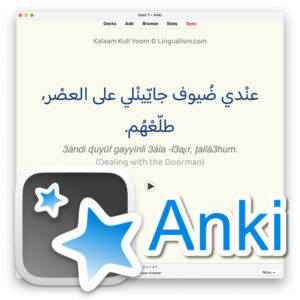Fairuz is one of the most admired and influential singers in the Arab world. Khalik Bel Bait (Stay at Home) is a well-known classic from her 1984 album Maarifti Feek. But the song has become very popular again this spring as it takes on new meaning with its lyrics خليك بالبيت (stay home), which is a trending hashtag on social media and local TV channels in this time of coronavirus and quarantine.
Have fun singing along while learning the lyrics. Below, you can see the Arabic script with tashkeel. Click on any line to expand it to reveal the English translation and language notes.
Stay home. Now I’m in love.
خلّى to keep
This verb has a number of idiomatic uses, two of which are heard throughout this song.
خلّيك is the imperative with a pronoun suffix. Literally, it would translate ‘keep yourself’, but it really means ‘stay.’ BUT this verb is only used in the imperative with this meaning. For the common verb for ‘stay’, you’ll have to wait until near the end of the song.
بِالبيْت (at) home; in the house
هلّأ (also spelled هلّق) now
حبّ to love, be/fall in love. In the imperfect tense, this verb would translate ‘love’. ‘Loved’ (as in ‘used to love’) would be كان يْحِبّ. But in the perfect tense, حبّ implies a change in state (from not loving to loving, that is, fell in love).
I will be alone, on my own if you leave.
رح will
رح كون I will be
وَحيد alone, lonely. Here, Fairouz uses the feminine form of the adjective, of course: وَحيدِة. Because the feminine ending ـِة usually sounds the same as ـي, it is often sounded out and written that way, as in the lyrics in the video. Can you spot the other occurrence of this in the song?
وَحْدو alone. This takes a personal pronoun, so here it’s وَحْدي. But notice that Feiruz makes it three syllables (poetic license!): وَحَدي
إن if
فلّى to leave
Please, stay home, stay.
الله يْخلّيك May God keep you [safe/from death]. But this is really just used idiomatically as a way to beg or implore someone to do something–a very strong ‘please’. But people hear the double meaning in this line especially now, in the time of the coronavirus pandemic.
I will be, my darling, on my own if you leave.
حبيبي darling.
Notice that this line is the same as the second line of the song, but with this word taking the place of وَحيدِة.
Please, stay home, stay.
Stay, don’t leave, I am missing you.
لا تْروح don’t go
The affirmative command ‘go’ would be روح, but remember that a negative command is formed with the bare imperfect tense. Of course, normally, the negative imperative is formed with the negative particle ما, but here, Fairuz uses the لا from MSA for poetic effect. (This is common in songs.)
مِشْتاق لـ missing
ليك to you
Stay, for I am deeply in love with your eyes.
كْتير a lot, very much
عيْن eye → عَيْنيْن eyes (dual)
ـك your
Please, stay home, stay.
Please, stay home, stay.
I am bored and hot, and it’s very quiet.
ضجْران bored, restless
شوْب hot. This is an invariable adjective, so it doesn’t take the feminine suffix ـة.
سُكوت quiet, tranquil
Now I’m in love.








This is a beautiful song. Aside of Saalouny El Nas, I wasn’t familiar with any of her other songs. Nice to discover a new one
I found an album she did called “Good Friday: Eastern Sacred Songs” that offer a number of interesting perspectives on Holy Friday, from Mary at the cross where Christ was crucified to announcing the rising again of the Messiah from death into eternal life. It’s worth checking out, regardless of your religious leanings:
https://www.youtube.com/watch?v=Hh_KgT3TGIQ&list=OLAK5uy_kGRiv0Z5Qdgkr_EqQtsdbjYJYCnHp8rWY
Additionally, it appears she has at least one Christmas album up:
https://www.youtube.com/watch?v=rlU0QwPPcCA&list=OLAK5uy_kV6m6h_sH9vsAK7XsoAaVfoIdEnRqDbOg
This is wonderful! It was fun to listen and read the notes. Thanks for creating this.
So beautiful. I love fairuz a lot. Her voice is unique💕
Sokran I love it. I’d like todo learn more